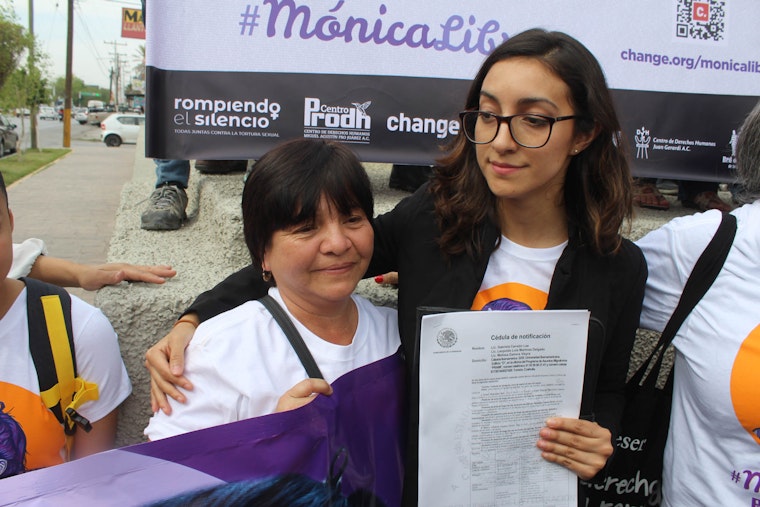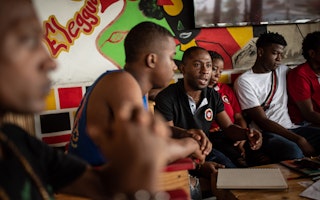Challenging Mexico’s Abusive Preventative Detention System
By Melissa Zamora Vieyra

Mónica Esparza began the year 2013 as a happy 26-year-old mother of four, a wife and the owner of an internet café and clothing business in the Mexican city of Torreón, Coahluila. But her life took a violent turn on February 12 of that year, when municipal police pulled her over as she was driving in a truck with her husband and brother. They arrested her without a warrant, blindfolded her, and took her to the back room of a police station. The officers held her there illegally for 14 hours in the presence of members of the military, gang-raping and torturing her in an attempt to coerce her into saying she was involved with Mexico’s one of the largest drug cartels, Las Zetas. All of the above occurred in the presence of her brother and her husband, who were both also tortured. Mónica broke down and signed a false confession.
That day in Mónica’s life stretched into seven more torturous years as an innocent victim of Mexico’s corrupt and inefficient judicial system held in so-called “preventative detention” awaiting a trial and sentencing. On March 12, 2020, the judge presiding over her case finally acquitted her, recognizing her innocence and ordering her immediate release.
“Given popular demand for an efficient legal system, in no democracy is it acceptable to violate the human rights of people subject to criminal proceedings. The Attorney General’s Office undeniably failed to prove her case beyond a reasonable doubt, so it’s only right to acquit the accused party and call for her immediate release,” the judge stated.
And yet, Mónica’s persecution continued. The attorney general’s office challenged the judge’s decision, arguing that there are “certain exceptions” for using evidence obtained by torture. Incredible as that may seem, this perspective on human rights is common in Mexico’s judicial system. One year later, the judge’s acquittal was upheld by the first unitary court, reaffirming Mónica’s innocence and ensuring her release.
Mónica’s story is one of the most notorious cases of extreme gender violence carried out by Mexican authorities, but it is far from the only one. According to the Latin American women’s rights organization EQUIS, the number of women detained and imprisoned by Mexican authorities for similar charges has increased by 103.3 percent in the last two years. `
I worked on Mónica’s case as a staff attorney for Centro Prodh, a non-profit organization seeking to promote human rights and dignity in Mexico. I believe her story offers some important lessons on how to combat the scourge of gender-based violence.
Here are some key takeaways from our successful case for Mónica’s freedom:
- We proved that the state’s argument for imprisoning on charges of armed kidnapping was deeply flawed. First, the prosecution never identified any of her alleged victims or presented any witnesses. Second, only law enforcement agents are legally allowed to possess the weapons she was accused of using.
- We put Mexico’s flawed preventative detention system on trial by framing the sexual and gender-based violence she suffered while incarcerated as constituting torture. The use of this system discourages authorities from looking into possible human rights violations taking place from the time of detention.
- Our communications team helped us to develop a successful media campaign that would generate widespread concern for Mónica’s case and thus pressure the Mexican government to take action. Our campaign was also incorporated into one known as Breaking the Silence: All Together Against Sexual Torture in Mexico.
- Thanks to a general support grant from the Open Society Foundations, we were able to cover the costs of Mónica’s legal defense and help her family to pay for her healthcare and for their travel to and from the prison where she was incarcerated.
The violations of Mónica’s human rights were so clear that they were formally acknowledged by the United Nations’ Working Group on Arbitrary Detention. With this recognition, we are now leveraging the ruling in Mónica’s case as grounds for acquitting other women in similar situations. The structural inequalities that allow gender-based violence to be so prevalent in our society have also normalized its use as torture in our criminal justice system. In fact, the Prodh Center has documented more than 30 cases in which public security agents have used sexual torture to carry out arrests against women and coerce them into participating in criminal investigations.
Another such case involves Claudia Medina, who was abducted from her home in August of 2012 by members of the Mexican Navy and taken to a naval base where officers used various forms of torture, including sexual assault, to force her to sign a confession for a crime she did not commit. In October of 2012, Medina filed a complaint with Mexico’s National Human Rights Commission, and in 2016, two years after joining the Breaking the Silence campaign, Mexican authorities dropped all charges against her.
There are too many others like Mónica and Claudia. We won’t rest until this abusive system is reformed and justice is served.
Centro Prodh is a grantee of the Open Society Foundations.
Melissa Zamora Vieyra is a staff attorney with Centro Prodh


